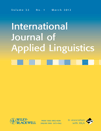
International Journal of Applied Linguistics
Scope & Guideline
Unveiling Insights into Language Use and Acquisition
Introduction
Aims and Scopes
- Language Learning and Teaching:
The journal emphasizes research on methodologies, strategies, and practices in language learning and teaching, including second language acquisition, bilingual education, and language assessment. - Sociolinguistics and Language Policy:
It explores the interplay between language, society, and culture, examining how sociocultural factors influence language use and educational practices. - Teacher Development and Professional Identity:
Research on teacher identity, agency, and professional development is a key focus, particularly how these elements affect language teaching effectiveness. - Technological Integration in Language Education:
The journal covers the impact of technology on language learning and teaching, including the use of digital tools, online learning environments, and artificial intelligence in education. - Multilingualism and Translation Studies:
It addresses issues related to multilingualism, translanguaging, and translation practices, reflecting the global nature of language education and use. - Emotional and Psychological Factors in Language Learning:
The journal investigates the emotional and psychological aspects of language learning, including motivation, anxiety, and identity, contributing to a holistic understanding of learner experiences.
Trending and Emerging
- Integration of Technology in Language Education:
There is a growing emphasis on research exploring the integration of technology, including generative AI and online platforms, in language learning and teaching, reflecting the digital transformation in education. - Emotional and Psychological Factors in Learning:
An increasing number of studies focus on emotional aspects of language learning, such as anxiety, motivation, and self-efficacy, acknowledging their critical role in student success and engagement. - Multilingualism and Translanguaging Practices:
Research on multilingualism and translanguaging is gaining traction, highlighting the benefits of leveraging diverse linguistic backgrounds in language education. - Contextualized and Culturally Responsive Pedagogy:
The journal is seeing a rise in studies that advocate for contextually relevant and culturally responsive teaching practices, aiming to meet the needs of diverse learner populations. - Research on Teacher Identity and Agency:
There is a notable trend towards understanding teachers' identities and agency within the educational landscape, reflecting the importance of teacher perspectives in language education.
Declining or Waning
- Traditional Grammar Instruction:
There has been a noticeable reduction in studies focusing on traditional grammar instruction methods, suggesting a shift towards more communicative and context-based approaches. - Linguistic Structures in Isolation:
Research that examines linguistic structures without considering their social and contextual relevance seems to be decreasing, as the journal increasingly emphasizes applied and contextualized linguistics. - Static Language Assessment Methods:
The focus on static, standardized language assessment methods is waning, with more interest shifting towards dynamic, formative assessments that consider learner variability and context. - Overly Theoretical Linguistic Models:
The journal appears to be moving away from highly theoretical models of linguistics that do not translate into practical applications, favoring research that has clear implications for teaching and learning. - Traditional Language Teaching Materials:
Research on traditional language teaching materials, such as textbooks, is less prevalent, indicating a growing interest in innovative, multimodal, and digital resources.
Similar Journals

Porta Linguarum
Fostering dialogue in the dynamic world of linguistics.Porta Linguarum, published by UNIV GRANADA in Spain, is a pioneering journal dedicated to the fields of linguistics and language studies, with a dual focus on the educational implications and applications within these disciplines. Launched in 2008 and continuing its impactful contributions into 2024, the journal is recognized for its rigorous peer-reviewed articles that address contemporary language issues, pedagogical approaches, and linguistic research, evidenced by its notable rankings in the 2023 Scopus metrics. Porta Linguarum holds a distinguished Q1 classification in Linguistics and Language, alongside a respectable Q3 placement in Education, marking it as a valuable resource for academics and practitioners alike. With an impressive ranking of 231 out of 1088 in the Arts and Humanities category and a strong 78th percentile ranking for Language and Linguistics, this journal facilitates the exchange of innovative ideas and promotes scholarly discourse. Although currently not adopting an open access model, it remains an essential platform for advancing knowledge in linguistics and education.
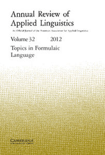
Annual Review of Applied Linguistics
Connecting researchers and practitioners in the world of applied linguistics.The Annual Review of Applied Linguistics, published by Cambridge University Press, stands as a premier journal in the realm of linguistics and psychology, with an impressive impact factor identifying its significance: ranking in the Q1 quartile across both fields in 2023. With an ISSN of 0267-1905 and an E-ISSN of 1471-6356, this journal endeavors to provide comprehensive and insightful reviews covering an array of topics within applied linguistics, thus supporting researchers, professionals, and students in advancing their understanding and expertise. Operating from its base in Cambridge, United Kingdom, the journal has maintained a consistent commitment to scholarly excellence since its inception, accelerating discussions on critical issues and emerging research trends from 2005 to 2024. Notably, it holds a prestigious position in Scopus, ranked #26 in Language and Linguistics and #30 in Social Sciences, showcasing its influence and contribution to the scholarship in the field. The Annual Review of Applied Linguistics thus stands as an essential resource for anyone engaged in linguistic research and application.
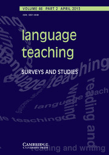
Language Teaching
Empowering educators with cutting-edge insights in language teaching.Language Teaching, published by Cambridge University Press, is a premier peer-reviewed journal that has been at the forefront of the linguistics and language education field since its inception in 1969. With an impressive impact factor positioning it in the top tier (Q1) of its category, this journal is ranked 22nd among 1,088 in the Arts and Humanities field and maintains an outstanding 98th percentile ranking. Focusing on innovative research and methodologies in language teaching and learning, Language Teaching provides a vital platform for discussing the latest developments in pedagogy, applied linguistics, and curriculum design. Although it does not offer open access options, it reaches a broad audience of researchers, educators, and practitioners dedicated to enhancing language instruction across various contexts. The journal continues to evolve, with plans to cover emerging trends and challenges in language education until 2024, making it an essential resource for anyone invested in the teaching of languages.

LFE-Revista de Lenguas para Fines Especificos
Unlocking the Potential of Language AcquisitionLFE-Revista de Lenguas para Fines Especificos is a distinguished academic journal focused on the field of applied linguistics and language education, published by UNIV LAS PALMAS GRAN CANARIA, SERV PUBL & DIF CIENT PARQUE CIENT. Established in 1993, this Open Access journal promotes the dissemination of research on specific purposes in language studies, making it an invaluable resource for researchers, educators, and students alike. Based in Spain, it serves an international audience interested in the intersection of language acquisition, pedagogy, and professional communication. Despite its recent entry into Scopus with competitive rankings in Social Sciences, particularly in Linguistics and Language and Education, the journal aims to continually enhance its impact by inviting innovative contributions that explore contemporary challenges and methodologies in language teaching and learning. Researchers are encouraged to tap into this growing repository of knowledge, which is easily accessible to foster collaborative and interdisciplinary dialogues within the field.
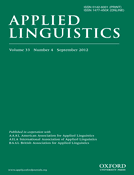
APPLIED LINGUISTICS
Connecting Scholars Through Language and CommunicationApplied Linguistics, published by Oxford University Press, is a premier scholarly journal that has significantly contributed to the fields of linguistics and communication since its inception in 1980. With an impressive impact factor and ranked in the top quartile (Q1) in both Communication and Linguistics and Language categories, Applied Linguistics is recognized for its rigorous peer-reviewed articles that explore the intersections of language, society, and cognition. The journal enjoys a remarkable position in the Scopus rankings, placing it among the top 2% of publications in its discipline. Researchers, professionals, and students benefit from its comprehensive scope, which encompasses innovative research on language acquisition, discourse analysis, and applied linguistics methodologies. Although not an open access journal, its commitment to advancing knowledge and fostering academic discussions makes it an indispensable resource for anyone interested in the critical role of language in various contexts.
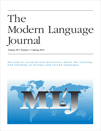
MODERN LANGUAGE JOURNAL
Fostering Insights in Linguistics and Language MethodologiesThe MODERN LANGUAGE JOURNAL, published by WILEY, stands as a premier academic resource in the field of linguistics and language studies. With its strong legacy dating back to 1916, this journal has evolved to address contemporary issues and trends in language learning, teaching, and research. It holds a prestigious Q1 ranking in both Linguistics and Language categories as of 2023, reflecting its high impact and relevance in scholarly discourse, supported by notable Scopus rankings that place it in the top percentiles of its field. The journal serves as an essential conduit for researchers, educators, and students seeking to contribute to and stay abreast of advancements in language education and linguistic theory. Although it does not currently offer open access options, the journal remains committed to disseminating significant findings that inspire innovative methodologies within the realm of modern languages.
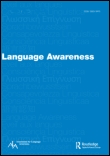
Language Awareness
Exploring Linguistic Insights for a Global AudienceLanguage Awareness is a leading academic journal published by Routledge Journals, Taylor & Francis Ltd, focusing on the intersection of language, education, and linguistic theory. Since its inception in 1992, this esteemed journal has provided a platform for scholarly discourse and research advancement, boasting a strong impact within its field, as indicated by its Q1 quartile rankings in both Education and Linguistics and Language as of 2023. The journal's commitment to promoting awareness and understanding of language use in diverse contexts is highlighted through rigorous peer-reviewed articles that cater to researchers, practitioners, and educators. With an impressive positioning in various Scopus categories—ranking 95th in Arts and Humanities, and 111th in Social Sciences—it ensures access to high-quality research that influences both pedagogy and linguistic methodologies. Although it does not offer Open Access options, its content remains essential for those passionate about linguistic research and educational innovation.
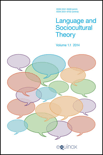
Language and Sociocultural Theory
Advancing Insights into Linguistic DynamicsLanguage and Sociocultural Theory, published by EQUINOX PUBLISHING LTD, stands as a vital resource for scholars in the domains of linguistic studies and cultural theory. With its ISSN 2051-9699 and E-ISSN 2051-9702, this UK-based journal has consistently achieved Q1 rankings in both Cultural Studies and Linguistics and Language as of 2023, demonstrating its significant impact within the academic community. The journal's position is further affirmed by its rankings in Scopus, where it occupies the 80th percentile in Cultural Studies and the 72nd percentile in Linguistics and Language, making it a leading platform for cutting-edge research. Though not an Open Access journal, it provides critical insights into the interconnectedness of language and sociocultural dynamics, making it essential reading for researchers, professionals, and students eager to explore the complexities of human communication. Spanning converged years from 2014 to 2023, the journal presents a rich collection of scholarly articles that strive to advance the field and inspire further academic inquiry.

Journal of Research in Applied Linguistics
Unlocking Insights in Language Acquisition and PedagogyJournal of Research in Applied Linguistics is an esteemed academic journal published by Shahid Chamran University Ahvaz, Iran, focusing on the dynamic field of linguistics and language studies. With an ISSN of 2345-3303 and an E-ISSN of 2588-3887, the journal has established itself as a valuable resource for researchers and professionals aiming to explore diverse issues related to applied linguistics, including language acquisition, pedagogy, and sociolinguistic interactions. As part of a robust academic community since its inception in 2017, it is recognized with a Q2 quartile ranking in the world of linguistics and achieved impressive Scopus ranks reflective of its growing impact, particularly within the arts and humanities. The journal embraces an open access policy, enhancing its reach and availability to a broad audience. Researchers, educators, and students alike will find in the Journal of Research in Applied Linguistics a critical platform for dialogue, innovation, and contribution to the evolving landscape of language research.
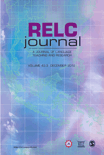
RELC Journal
Leading the Way in Linguistic and Educational ExcellenceRELC Journal, published by SAGE Publications Ltd, stands as a leading platform in the fields of Education and Linguistics, boasting an impressive Q1 ranking in both categories according to the latest metrics. Established in 1970 and continuing its commitment to academic excellence through 2024, the journal features rigorous peer-reviewed research that explores the intersections of language, culture, and pedagogy. With a notable Scopus ranking that places it in the 98th percentile for both Language and Linguistics (Rank #16/1088) and Education (Rank #91/1543), the RELC Journal is essential for scholars, educators, and practitioners seeking to contribute to and stay abreast of cutting-edge developments in their respective fields. Although currently not open access, the journal remains accessible to a diverse audience and invites contributions that challenge conventional perspectives and inspire innovative practices in language education.